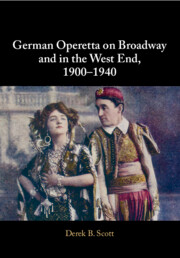Book contents
- German Operetta on Broadway and in the West End, 1900–1940
- German Operetta on Broadway and in the West End, 1900–1940
- Copyright page
- Contents
- Figures and Tables
- Music Examples
- Acknowledgements
- Introduction
- Part I The Production of Operetta
- Part II The Reception of Operetta
- Postlude: The Demise of Operetta
- Book part
- Bibliography
- Reference
- Index
- References
Bibliography
Published online by Cambridge University Press: 27 June 2019
- German Operetta on Broadway and in the West End, 1900–1940
- German Operetta on Broadway and in the West End, 1900–1940
- Copyright page
- Contents
- Figures and Tables
- Music Examples
- Acknowledgements
- Introduction
- Part I The Production of Operetta
- Part II The Reception of Operetta
- Postlude: The Demise of Operetta
- Book part
- Bibliography
- Reference
- Index
- References
- Type
- Chapter
- Information
- German Operetta on Broadway and in the West End, 1900–1940 , pp. 351 - 367Publisher: Cambridge University PressPrint publication year: 2019
- Creative Commons
- This content is Open Access and distributed under the terms of the Creative Commons Attribution licence CC-BY-NC-ND 4.0 https://creativecommons.org/cclicenses/



